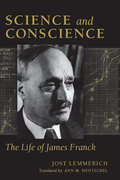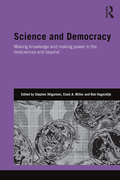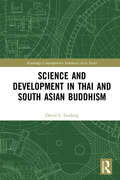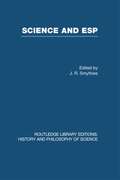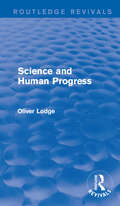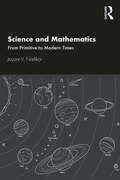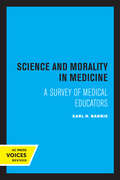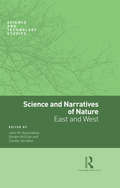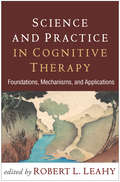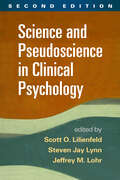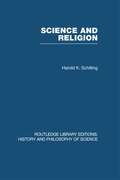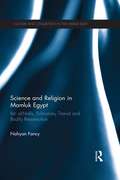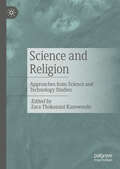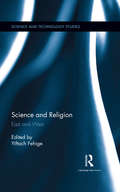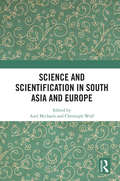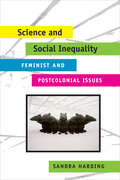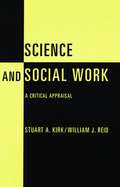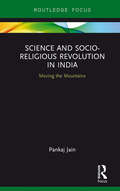- Table View
- List View
Science Wars
by Andrew RossIn the wake of the highly fractious Culture Wars, conservatives in science have launched a backlash against feminist, multiculturalist, and social critics in science studies. Paul Gross and Norman Levitt's book Higher Superstition, presented as a wake-up call to scientists unaware of the dangers posed by the "science-bashers," set the shrill tone of this reaction and led to the appearance of a growing number of scare stories about an "antiscience" movement in the op-ed sections of newspapers across the country. Unwilling to be political scapegoats for the decline in the public funding of science and the erosion of the public authority of scientists, many of these critics--natural scientists, sociologists, anthropologists, historians, and scholars in cultural studies and literary studies--have taken the opportunity to respond to the backlash in Science Wars.At a time when scientific knowledge is systematically whisked out of the domain of education and converted into private capital, the essays in this volume are sharply critical of the conservative defense of a value-free science. They suggest that in a world steeped in nuclear, biogenic, and chemical overdevelopment, those who are skeptical of technology are more than entitled to ask for evidence of rationality in those versions of scientific progress that respond only to the managerial needs of state, corporate, and military elites. Whether uncovering the gender-laden assumptions built into the Western scientific method, redefining the scientific claim to objectivity, showing the relationship between science's empirical worldview and that of mercantile capitalism, or showing how the powerful language of science exercises its daily cultural authority in our society, the essays in Science Wars announce their own powerful message. Analyzing the antidemocratic tendencies within science and its institutions, they insist on a more accountable relationship between scientists and the communities and environments affected by their research.Revised and expanded from a recent issue of Social Text, Science Wars will provoke thought and controversy among scholars and general readers interested in science studies and current cultural politics.Contributors. Stanley Aronowitz, Sarah Franklin, Steve Fuller, Sandra Harding, Roger Hart, N. Katherine Hayles, Ruth Hubbard, Joel Kovel, Les Levidow, George Levine, Richard Levins, Richard C. Lewontin, Michael Lynch, Emily Martin, Dorothy Nelkin, Hilary Rose, Andrew Ross, Sharon Traweek, Langdon Winner
Science and Conscience: The Life of James Franck
by Jost LemmerichJames Franck (1882-1964) was one of the twentieth century's most respected scientists, known both for his contributions to physics and for his moral courage. During the 1920s, Franck was a prominent figure in the German physics community. His research into the structure of the atom earned him the Nobel Prize in Physics in 1925. After the Nazis seized power in 1933, Franck resigned his professorship at Gottingen in protest against anti-Jewish policies. He soon emigrated to the United States, where, at the University of Chicago, he began innovative research into photosynthesis.
Science and Democracy: Making Knowledge and Making Power in the Biosciences and Beyond (Genetics and Society)
by Stephen Hilgartner Clark Miller Rob HagendijkIn the life sciences and beyond, new developments in science and technology and the creation of new social orders go hand in hand. In short, science and society are simultaneously and reciprocally coproduced and changed. Scientific research not only produces new knowledge and technological systems but also constitutes new forms of expertise and contributes to the emergence of new modes of living and new forms of exchange. These dynamic processes are tightly connected to significant redistributions of wealth and power, and they sometimes threaten and sometimes enhance democracy. Understanding these phenomena poses important intellectual and normative challenges: neither traditional social sciences nor prevailing modes of democratic governance have fully grappled with the deep and growing significance of knowledge-making in twenty-first century politics and markets. Building on new work in science and technology studies (STS), this book advances the systematic analysis of the coproduction of knowledge and power in contemporary societies. Using case studies in the new life sciences, supplemented with cases on informatics and other topics such as climate science, this book presents a theoretical framing of coproduction processes while also providing detailed empirical analyses and nuanced comparative work. Science and Democracy: Knowledge as Wealth and Power in the Biosciences and Beyond will be interesting for students of sociology, science & technology studies, history of science, genetics, political science, and public administration.
Science and Development in Thai and South Asian Buddhism (Routledge Contemporary Southeast Asia Series)
by David L GoslingBecoming a Buddhist monk in Thailand has for a long time provided the opportunity for access to a good education and to social advancement, both to bright, poor rural youths and to members of the urban elite whose youth often become monks for a few months as a rite of passage into adulthood. Moreover, although women are not allowed to become fully fledged monks, recent developments have encouraged a special status akin to nuns for many devout Thai Buddhist women. All this has resulted in large numbers of well-educated, well-motivated Buddhist religious people, keen both to engage in religious contemplation and also determined to contribute to this-worldly social, economic, educational and medical development goals. This book, by a leading authority on the subject, considers the role of Thai Buddhist religious people in development within Thailand. It discusses how Thai Buddhism has evolved philosophically and in its organisation to allow this, examines various examples of Buddhist people's engagement in development projects, and assesses how the situation is likely to unfold going forward. In addition, the book considers the relationship between science and religion in Thai Buddhism and also some aspects of the parallel situation in Sri Lanka.
Science and ESP (Routledge Library Editions: History & Philosophy of Science)
by J. R. SmythiesOriginally published in 1967. Representing the viewpoints of philosophers, psychologists, anthropologists, physicists, psychoanalysts, parapsychologists, psychiatrists and biologists, this volume discusses many aspects of ESP. The general theme is that the phenomena is very valid and can no longer be ignored.
Science and Homosexualities: A Guide To The Debates (Controversies In Science Ser.)
by Vernon A. RosarioScience and Homosexualities is the first anthology by historians of science to examine European and American scientific research on sexual orientation since the coining of the word "homosexual" almost 150 years ago. This collection is particularly timely given the enormous scientific and popular interest in biological studies of homosexuality, and the importance given such studies in current legal, legislative and cultural debates concerning gay civil rights. However, scientific and popular literature discussing the biology of sexual orientation have been short-sighted in representing it as objective, new scientific work. This volume demonstrates that the quest for the biological "cause" of homosexuality and other sexualities is as old as the term itself. These essays explore the active role experimental subjects played in shaping scientific theories of homosexuality and cultural perceptions of sexuality and sexual identity. Finally this anthology studies the way in which this doctor-patient interaction shaped not only scientific theories of homosexuality, but also cultural perceptions and self-identities as well. Contributors include: Garland E. Allen, Erin G. Carlston, Julian Carter, Alice D. Dreger, Anne Fausto-Sterling, Margaret Gibson, Stephanie Kenen, Hubert Kennedy, Harry Oosterhuis, James Steakley, Richard Pillard, Jennifer Terry
Science and Human Progress (Routledge Revivals)
by Oliver Sir LodgeOriginally delivered as a series of lectures for the Halley Stewart trust in 1926, Lodge’s work was collected and first published in 1927. Lodge uses his scientific training to inquire into such general issues as religion, human progress, and societal advances with an aim to better understand the physical order of the universe. This title will be of interest to students of philosophy, particularly those interested in the development of early twentieth century thought.
Science and Innovations for Food Systems Transformation
by Louise O. Fresco Joachim Von Braun Mohamed Hag Ali Hassan Kaosar AfsanaThis Open Access book compiles the findings of the Scientific Group of the United Nations Food Systems Summit 2021 and its research partners. The Scientific Group was an independent group of 28 food systems scientists from all over the world with a mandate from the Deputy Secretary-General of the United Nations. The chapters provide science- and research-based, state-of-the-art, solution-oriented knowledge and evidence to inform the transformation of contemporary food systems in order to achieve more sustainable, equitable and resilient systems.
Science and Mathematics: From Primitive to Modern Times
by Jayant V. NarlikarThis book offers an engaging and comprehensive introduction to scientific theories and the evolution of science and mathematics through the centuries. It discusses the history of scientific thought and ideas and the intricate dynamic between new scientific discoveries, scientists, culture and societies. Through stories and historical accounts, the volume illustrates the human engagement and preoccupation with science and the interpretation of natural phenomena. It highlights key scientific breakthroughs from the ancient to later ages, giving us accounts of the work of ancient Greek and Indian mathematicians and astronomers, as well as of the work of modern scientists like Descartes, Newton, Planck, Mendel and many more. The author also discusses the vast advancements which have been made in the exploration of space, matter and genetics and their relevance in the advancement of the scientific tradition. He provides great insights into the process of scientific experimentation and the relationship between science and mathematics. He also shares amusing anecdotes of scientists and their interactions with the world around them. Detailed and accessible, this book will be of great interest to students and researchers of science, mathematics, the philosophy of science, science and technology studies and history. It will also be useful for general readers who are interested in the history of scientific discoveries and ideas.
Science and Morality in Medicine: A Survey of Medical Educators
by Earl R. BabbieThis title is part of UC Press's Voices Revived program, which commemorates University of California Press’s mission to seek out and cultivate the brightest minds and give them voice, reach, and impact. Drawing on a backlist dating to 1893, Voices Revived makes high-quality, peer-reviewed scholarship accessible once again using print-on-demand technology. This title was originally published in 1970.
Science and Narratives of Nature: East and West (Science and Technology Studies)
by Sundar SarukkaiThe discourse and practice of science are deeply connected to explicit and implicit narratives of nature. However, nature has been understood in diverse ways by cultures across the world. Could these different views of nature generate the possibility of alternate views on science? Part of the innovative series Science and Technology Studies, this volume looks at different conceptualizations of nature and the manner in which they structure the practice of the sciences. The essays draw upon philosophy, history, sociology, religion, feminism, mathematics and cultural studies, and establish a dialogue between cultures through a multi-disciplinary exploration of science. With contributions from major scholars in the field, this volume will deeply interest scholars and students of science and technology studies; sociology, history and philosophy of science; as also environmental studies.
Science and Practice in Cognitive Therapy: Foundations, Mechanisms, and Applications
by Robert L. LeahyFrom leading experts in cognitive-behavioral therapy (CBT)--including CBT originator Aaron T. Beck and many who have worked closely with him--this book provides an overview of where the field is today and presents cutting-edge research and clinical applications. Contributors explain how Beck's cognitive model has been refined and tested over the last 45 years and describe innovative CBT approaches that integrate mindfulness, imagery, emotion-focused interventions, and other strategies. Chapters on specific clinical problems cover the conceptualization and treatment of depression, anxiety disorders, posttraumatic stress disorder, obsessive–compulsive disorder, insomnia, suicidality, substance abuse, couple and family problems, bipolar disorder, psychosis, and personality disorders.
Science and Pseudoscience in Clinical Psychology
by Scott LilienfeldThis book offers a rigorous examination of a variety of therapeutic, assessment, and diagnostic techniques in clinical psychology, focusing on practices that are popular and influential but lack a solid grounding in empirical research. Featuring chapters from leading clinical researchers, the text helps professionals and students evaluate the merits of novel and controversial techniques and differentiate between those that can stand up to scientific scrutiny and those that cannot. Reviewed are widely used therapies for alcoholism, infantile autism, and ADHD; the use of EMDR in the treatment of posttraumatic stress disorder; herbal remedies for depression and anxiety; suggestive techniques for memory recovery; and self-help models. Other topics covered include issues surrounding psychological expert testimony, the uses and abuses of projective assessment techniques, and unanswered questions about dissociative identity disorder. Offering a balanced, constructive review of available research, each accessibly written chapter concludes with a glossary of key terms.
Science and Pseudoscience in Clinical Psychology, Second Edition
by Carol Tavris Scott O. Lilienfeld Steven Jay Lynn Jeffrey M. LohrThis valued resource helps practitioners and students evaluate the merits of popular yet controversial practices in clinical psychology and allied fields, and base treatment decisions on the best available research. Leading authorities review widely used therapies for a range of child, adolescent, and adult disorders, differentiating between those that can stand up to the rigors of science and those that cannot. Questionable assessment and diagnostic techniques and self-help models are also examined. The volume provides essential skills for thinking critically as a practitioner, evaluating the validity of scientific claims, and steering clear of treatments that are ineffective or even harmful. New to This Edition *Reflects the significant growth of evidence-based practices in the last decade. *Updated throughout with the latest treatment research. *Chapter on attachment therapy. *Chapter on controversial interventions for child and adolescent antisocial behavior. *Addresses changes in DSM-5.
Science and Religion (Routledge Library Editions: History & Philosophy of Science)
by Harold K. SchillingOriginally published in 1963.This volume provides a rigorous interpretation that portrays science and religion in their actualities as personal, communal and cultural phenomena involving different concerns, conceptions and modes of inquiry. The role of key aspects of their life and thought are investigated. They are found to be remarkably alike and their basic differences, far from making them mutually exclusive, reveal them as potentially complimentary and mutually helpful.
Science and Religion in Mamluk Egypt: Ibn al-Nafis, Pulmonary Transit and Bodily Resurrection (Culture and Civilization in the Middle East)
by Nahyan FancyThe discovery of the pulmonary transit of blood was a ground-breaking discovery in the history of the life sciences, and a prerequisite for William Harvey’s fully developed theory of blood circulation three centuries later. This book is the first attempt at understanding Ibn al-Nafīs’s anatomical discovery from within the medical and theological works of this thirteenth century physician-jurist, and his broader social, religious and intellectual contexts. Although Ibn al-Nafīs did not posit a theory of blood circulation, he nevertheless challenged the reigning Galenic and Avicennian physiological theories, and the then prevailing anatomical understandings of the heart. Far from being a happy guess, Ibn al-Nafīs’s anatomical result is rooted in an extensive re-evaluation of the reigning medical theories. Moreover, this book shows that Ibn al-Nafīs’s re-evaluation is itself a result of his engagement with post-Avicennian debates on the relationship between reason and revelation, and the rationality of traditionalist beliefs, such as bodily resurrection. Breaking new ground by showing how medicine, philosophy and theology were intertwined in the intellectual fabric of pre-modern Islamic societies, Science and Religion in Mamluk Egypt will be of interest to students and scholars of the History of Science, the History of Medicine and Islamic Studies.
Science and Religion: Approaches from Science and Technology Studies
by Zara Thokozani KamwendoThis edited volume offers new and exciting perspectives on the social study of science and religion through current scholarship grounded in Science and Technology Studies (STS). The contributors explore how STS theories, methods, and concepts can be applied to the study of religion, as well as how to incorporate aspects of religion into STS. The purpose of the volume is to advance the social study of science and religion by fostering the already interdisciplinary nature of the field and to encourage engagement with the intersection between science and religion from a wide range of perspectives.
Science and Religion: East and West (Science and Technology Studies)
by Yiftach FehigeThis volume situates itself within the context of the rapidly growing interdisciplinary field that is dedicated to the study of the complex interactions between science and religion. It presents an innovative approach insofar as it addresses the Eurocentrism that is still prevalent in this field. At the same time it reveals how science develops in the space that emerges between the ‘local’ and the ‘global’. The volume examines a range of themes central to the interaction between science and religion: ‘Eastern’ thought within ‘Western’ science and religion and vice versa, and revisits thinkers who sought to integrate ‘Eastern’ and ‘Western’ thinking. It studies Zen Buddhism and its relation to psychotherapy, Islamic science, Vedantic science, atheism in India, and Darwinism, offering in turn new perspectives on a variety of approaches to nature. Part of the Science and Technology Studies series, this volume brings together original perspectives from major scholars from across disciplines and will be of great interest to scholars and students of science and technology studies, history of science, philosophy of science, religious studies, and sociology.
Science and Scientification in South Asia and Europe
by Christoph Wulf Axel MichaelsThis volume critically examines the role of science in the humanities and social sciences. It studies how cultures and societies in South Asia and Europe underwent a transformation with the adoption or adaptation of scientific methods, turning ancient cultural processes and phenomena into an enhanced scientific structure. The chapters in this book Discuss the development of science as a method in modern and historical contexts and the differences between modern science, scientification and pseudoscience. Study the interactions between bodies of knowledge such as Sanskrit and computer science; mathematics and Vedic mathematics; science and philosophy. Drawing on textual material, extensive fieldwork and in-depth interviews, this book will be of great interest to scholars and researchers of philosophy, Indology, history, linguistics, history and philosophy of science and social science.
Science and Social Inequality: Feminist and Postcolonial Issues (Race and Gender in Science Ser.)
by Sandra HardingHarding argues that the philosophy and practices of today's Western science, contrary to its enlightenment mission, actually work to insure that more science will only worsen existing gaps between the best and worst of societies around the world.
Science and Social Inequality: Feminist and Postcolonial Issues (Race and Gender in Science)
by Sandra HardingIn Science and Social Inequality, Sandra Harding makes the provocative argument that the philosophy and practices of today's Western science, contrary to its Enlightenment mission, work to insure that more science will only worsen existing gaps between the best and worst off around the world. She defends this claim by exposing the ways that hierarchical social formations in modern Western sciences encode antidemocratic principles and practices, particularly in terms of their services to militarism, the impoverishment and alienation of labor, Western expansion, and environmental destruction. The essays in this collection--drawing on feminist, multicultural, and postcolonial studies--propose ways to reconceptualize the sciences in the global social order. At issue here are not only social justice and environmental issues but also the accuracy and comprehensiveness of our understandings of natural and social worlds. The inadvertent complicity of the sciences with antidemocratic projects obscures natural and social realities and thus blocks the growth of scientific knowledge. Scientists, policy makers, social justice movements and the consumers of scientific products (that is, the rest of us) can work together and separately to improve this situation.
Science and Social Work: A Critical Appraisal
by William J. Reid Stuart KirkScience and Social Work is a critical appraisal of the strategies and methods that have been used to develop knowledge for social work practice. It identifies the major ways in which social workers have drawn upon scientific knowledge and techniques, placing each one in historical perspective by explaining the nature of the problems it was designed to solve and the philosophical, political, and practical questions it raised. Kirk and Reid offer a balanced appraisal of the promises, accomplishments, and limits of such approaches, demonstrating how the fruits of scientific research can aid clinical practice with individuals, families and groups.
Science and Socio-Religious Revolution in India: Moving the Mountains
by Pankaj JainScholars have long noticed a discrepancy in the way non-Western and Western peoples conceptualize the scientific and religious worlds. Non-Western traditions and communities, such as of India, are better positioned to provide an alternative to the Western dualistic thinking of separating science and religion. The Himalayan Environmental Studies and Conservation Organization (HESCO) was founded by Dr. Anil Joshi in the 1970s as a new movement looking at the economic and development needs of rural villages in the Indian Himalayas, and encouraging them to use local resources in order to open up new avenues to self-reliance. This book argues that the concept of dharma, the law that supports the regulatory order of the universe in Indian culture, can be applied as an overarching term for HESCO’s socio-economic work. This book presents the social-environmental work in contemporary India by Dr. Anil Joshi in the Himalayas and by Baba Seechewal in Punjab, combining the ideas of traditional and scientific ecological knowledge systems. Based on these two examples, the book presents the holistic model transcending the dichotomies of nature vs. culture and science vs. religion, especially as practiced and utilized in the non-Western society such as India. Using the example of HESCO, the book highlights that the very categories of religion and science are problematic when applied to non-Western traditions, but that Western technologies can be radically transformed through integration with regional legacies to enable the flourishing of a multiplicity of knowledge-traditions and the societies that depend upon them. It will be of interest to students and scholars of South Asian Studies, Religion, Environmental Studies, Himalayan Studies, and Development Studies.
Science and Sustainability
by Joy HendryIndigenous science is often dismissed as quackery or nonsense, out of touch with progress and current events. However, Indigenous peoples have passed down vital information for generations, from which local plants help cure common ailments, to which parts of the land are unsuitable for buildings because of likely earthquakes. These scientific practices that have been developed by Indigenous peoples around the world have been largely ignored by Western colonizers in their lands. From Japan and New Zealand to Australia and Canada, Indigenous science involves environmentally-focused, sustainable practices that allow people to live with the land rather than in spite of it. Here, Hendry examines science through these Indigenous roots, problematizing the idea that Western science is the only type that deserves that name and drawing attention to some of its shortcomings. She takes the reader with her on the learning process and shares a myriad of sustainable examples that can be put into practice.
Science and Technology
by Dimitris N. ChorafasThe aim of this book is to explore science and technology from the viewpoint of creating new knowledge, as opposed to the reinterpretation of existing knowledge in ever greater but uncertain detail. Scientists and technologists make progress by distinguishing between what they regard as meaningful and what they consider as secondary or unimportant. The meaningful is dynamic; typically, the less important is static. Science and technology have made a major contribution to the culture and to the standard of living of our society. From antiquity to the present day, the most distinguished scientists and technologists have been thinkers, experimenters and persons willing and able to challenge "the obvious". Technology develops products and processes based on the breakthroughs of science. If technologists fail to steadily upgrade their skills, tools and methods, they will only be as good as their last design, risking obsolescence. Using practical examples and case studies, this book documents the correlations existing between science and technology, and elucidates these correlations with practical applications ranging from real-life situations, from R&D to energy production. As it is a salient problem, and a most challenging one to our society, power production has been chosen as a major case study. The holistic approach to science and technology followed by this text enhances the ability to deliver practical results. This book is intended for students and researchers of science, technology and mathematical analysis, while also providing a valuable reference book for professionals. Its subject is one of the most debated problems of mankind.

